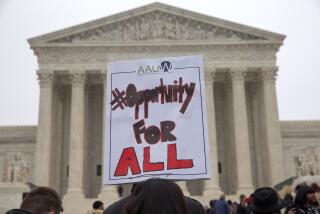Dean Dunlavey, 77; Won Case to Allow VCR Taping
- Share via
Dean C. Dunlavey, a Los Angeles trial lawyer who gained national recognition in 1984 after successfully arguing before the U.S. Supreme Court that consumers have the right to videotape copyrighted movies and other programs on television for their own use, has died. He was 77.
Dunlavey died Saturday at a San Pedro hospital of complications from a fall.
As a partner in the Los Angeles firm of Gibson, Dunn & Crutcher, Dunlavey tried nearly 100 cases during his 34-year legal career, including arguing and winning several cases before the U.S. Supreme Court.
The most important was the landmark Sony Corp. of America vs. Universal City Studios Inc., more commonly known as “the Betamax case.”
Universal City Studios and Walt Disney Productions, seeking damages and an injunction against the manufacture and sale of home video recorders, sued Sony, which marketed the Betamax video recorder. Also named in the suit were four retail distributors of Sony’s Betamax, an advertising agency and a single Betamax owner.
During a trial in U.S. District Court in California in 1979, the studios argued that consumers’ use of the Betamax infringed on the studios’ copyrights and that by making the devices available to the public those named in the suit were “contributory infringers.”
The District Court ruled in Sony’s favor, but the U.S. 9th Circuit Court of Appeals in San Francisco overturned that decision in 1981, saying Sony infringed on the studios’ copyrights by enabling videocassette recorder owners to tape programs on television without paying royalties.
Sony then appealed to the U.S. Supreme Court.
As Sony’s attorney, Dunlavey urged the justices, during the second of two oral arguments in 1983, to reject the movie industry’s view and allow Americans to continue to have unrestricted use of the recorders. Dunlavey contended that because the movie studios are paid for selling their product to television, they are not entitled to further compensation if the movies are recorded by viewers.
“The studios have been paid once. There’s no reason they should be paid twice,” Dunlavey said.
Stephen Kroft, a Beverly Hills lawyer representing the movie studios, told the justices that the VCRs constitute “a billion-dollar industry based on the taking of someone else’s property” and that Sony is selling the machines “for the primary purpose of recording copyrighted material.”
In its 5-4 decision in January 1984, the court ruled that consumers do not violate federal copyright law when they use videocassette recorders to tape television programs for their own use, nor do companies that make or sell the VCRs violate the copyright law by making them available to the public.
The long-awaited decision in the high-stakes case was considered a major victory for the electronics industry, which expected to have VCRs in about 9 million homes by the end of 1984.
A memo that circulated among the 300 lawyers at Gibson, Dunn & Crutcher after the ruling praised Dunlavey, saying it is “universally agreed by all Supreme Court watchers that Dean’s oral argument made all the difference” in the close case.
“To my dad, it wasn’t that big a deal,” Dean Geoffrey Dunlavey, a Costa Mesa lawyer, said this week. “He was the kind of guy who was always spoiling for a fight in a lawsuit. He loved to mix it up with people and have a battle of wits with them. He viewed this as [just] another case, but because it was such a seminal copyright case, that’s how people tend to remember him.”
As the senior Dunlavey told the Daily Journal, a Los Angeles-based legal newspaper, shortly after his Supreme Court victory: “I have done nothing but litigation since the day I walked in the door here. I can’t think of a better way of making a living than fighting with people and getting paid for it.”
Born in Waterloo, Iowa, on Oct. 31, 1925, Dunlavey spent a year at Iowa State University before volunteering for the Army and serving as an infantry captain in the Pacific during World War II.
After the war, he attended Harvard College on the GI Bill and earned a bachelor’s degree in chemistry in 1949. He received a doctorate in nuclear chemistry from UC Berkeley in 1952, working with Nobel Prize winner Glenn T. Seaborg and a team of scientists that created two trans-uranium elements, berkelium and californium.
He then entered the law school at Berkeley, where he graduated first in his class in 1955, served as editor-in-chief of the California Law Review and joined the school’s other top law students by being made a member of the Order of the Coif.
Of his dramatic switch from nuclear chemistry to law, Dunlavey told the Daily Journal: “I realized I wasn’t going to be satisfied spending my life in a laboratory. I’d been in the Army infantry in a combat unit, and I just enjoy fighting with people, so where better to go than law?”
Dunlavey subsequently taught at Harvard Law School, where he also earned a master’s of law degree. He joined Gibson, Dunn & Crutcher in 1956 and was named a fellow in the American College of Trial Lawyers in 1970. He retired in 1990.
In addition to Dean, Dunlavey is survived by his wife of 54 years, Dorian; two other sons, Dudley and Dana; and four grandchildren.
A memorial service will be held at 2 p.m. July 19 at St. Peter’s By the Sea Presbyterian Church, 6410 Palos Verdes Drive South, Rancho Palos Verdes.
In lieu of flowers, the family requests that memorial donations be made to the animal rescue organization Delta Rescue, P.O. Box 9, Glendale, CA 91209.
More to Read
The biggest entertainment stories
Get our big stories about Hollywood, film, television, music, arts, culture and more right in your inbox as soon as they publish.
You may occasionally receive promotional content from the Los Angeles Times.










